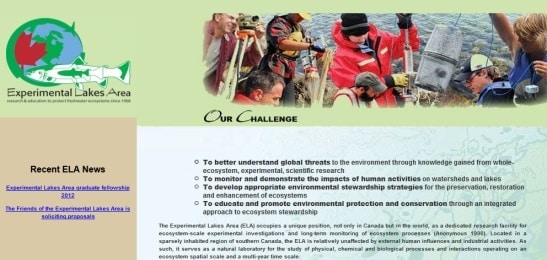Canadian greens say lake-destroying research is all about science – but how do we know for sure?

I recently received a press release from Terry Collins & Associates. This media relations company writes and distributes news releases about, among other things, “science research at the UN.”
As the author of an entire book about the scandalous state of the UN’s Intergovernmental Panel on Climate Change (IPCC), I now have a good idea what the UN means when it talks about “science.”
What’s really going on is that UN bureaucrats hand-pick people with certain scientific credentials and, shall we say, certain political predispositions.
They present these people with an outline of what they should write about, tell them how many words they are allowed to say it in, and make it near impossible for them to stray beyond a tightly-controlled framework. No thinking outside the box or colouring outside the lines.
And then, voila! The UN claims the final report is the product of some of the world’s leading minds, representing nations all over the world.
Think I’m exaggerating? Check out my earlier post Cogs in the Climate Machine. As I explain there, the authors currently at work on a chapter of the IPCC’s upcoming report have no authority to change the word “systems” to “ecosystems” in that chapter’s title:
A change as minor as this one – involving only three letters – cannot be made without petitioning multiple layers of the IPCC’s bureaucracy.
But to get back to the press release that landed in my inbox. The online version can be seen here. It tells us that a gentleman at the International Institute for Sustainable Development is applauding a decision by the province of Ontario to continue funding for a project I’ve never heard of.
It’s called the Experimental Lakes Area and, according to the press release, it’s a source of “important science” and “a rare opportunity for research, perhaps unique in the world.”
A few days ago, journalist Mark Bonokoski expressed a different point-of-view. The subtitle of his column: For decades, scientists have taken pristine lakes and polluted the hell out of them – just to see what would happen.
It seems that our homegrown environmentalists – including Elizabeth May, the leader of Canada’s Green Party – find themselves in an odd position. They appear to be aggressively championing a project that involves the deliberate despoiling of remote lakes.
I have no idea who’s interpretation is correct in this instance. But I can say this:
- I’m highly skeptical of press releases containing the term “sustainability”
- I don’t believe a word uttered by Green Party politicians
- “United Nations” and “science” don’t belong together
The process of writing my book has taught me that it is unwise to take the opinions of any “scientist” at face value. Scientists are merely people. They bring all kinds of baggage to the table – hidden assumptions, philosophical positions that blind them to alternative possibilities, and plain old self-interest.
In that regard, the New York Times recently ran a profile of Diederik Stapel, a disgraced Dutch professor who has confessed to making up research results out of thin air.
His fraudulent work was published in some of the world’s most prestigious journals. Indeed, he himself was a senior editor at one such journal.
Cathy Foley, president of Science and Technology Australia, is a fan of the peer-review process employed by academic journals. In a 2011 opinion piece, she urged us to trust what appears in these publications:
when scientists get it wrong, the self-correcting nature of the peer review process has allowed knowledge to be refined.Scientists have no harsher critics than other scientists.What we can do is respect the peer-reviewed science as the best information we have.
But the peer-review process failed to notice Stapel’s fraud. It wasn’t anyone associated with Science who blew the whistle on him. It was two of his own graduate students.
Supporting the idea that scientists are only people, that New York Times profile contains the following passage:
What the public didn’t realize, [Stapel] said, was that academic science, too, was becoming a business. “There are scarce resources, you need grants, you need money, there is competition,” he said. “Normal people go to the edge to get that money. Science is of course about discovery, about digging to discover the truth. But it is also communication, persuasion, marketing. I am a salesman. I am on the road. People are on the road with their talk. With the same talk. It’s like a circus.” He named two psychologists he admired.neither of whom has been accused of fraud. “They give a talk in Berlin, two days later they give the same talk in Amsterdam, then they go to London. They are traveling salesmen selling their story.”
Today’s moral lesson: scientists aren’t holy men, pronouncing the gospel truth. They may, in fact, be closer to circus performers.
Just because some of them insist that the Experimental Lake Area is a sound and sensible project, therefore, doesn’t make it so.





